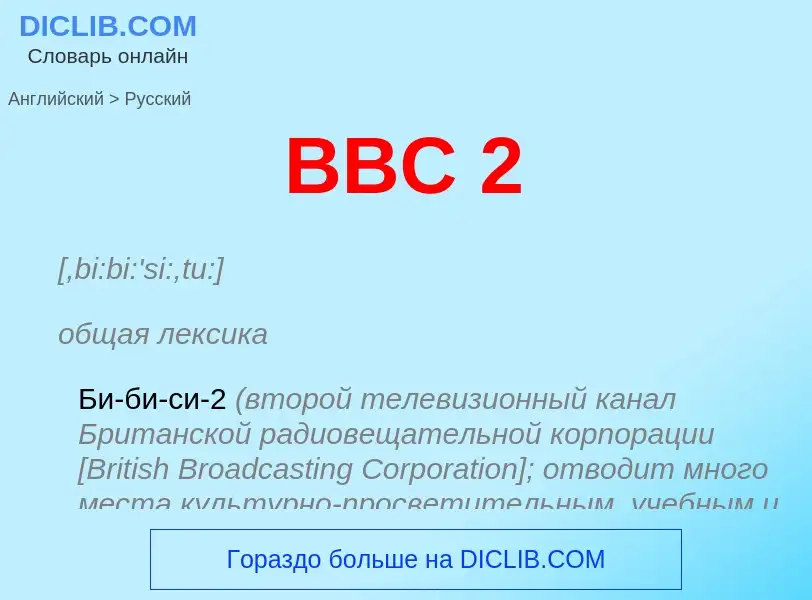Translation and analysis of words by ChatGPT artificial intelligence
On this page you can get a detailed analysis of a word or phrase, produced by the best artificial intelligence technology to date:
- how the word is used
- frequency of use
- it is used more often in oral or written speech
- word translation options
- usage examples (several phrases with translation)
- etymology
BBC 2 - translation to English
[,bi:bi:'si:,tu:]
общая лексика
Би-би-си-2 (второй телевизионный канал Британской радиовещательной корпорации [British Broadcasting Corporation]; отводит много места культурно-просветительным, учебным и политическим передачам. Работает с 1964)
[,bi:bi:'si:,wʌn]
общая лексика
Би-би-си-1 (первый телевизионный канал Британской радиовещательной корпорации [British Broadcasting Corporation]. Работает с 1964)
[,bi:bi:'si:,sɪmfənɪ,ɔ:kɪstrə]
общая лексика
Симфонический оркестр Би-би-си (один из ведущих оркестров; его концерты обыкн. передаются по радио и телевидению)
Wikipedia
BBC Two is a British free-to-air public broadcast television channel owned and operated by the BBC. It covers a wide range of subject matter, with a remit "to broadcast programmes of depth and substance" in contrast to the more mainstream and popular BBC One.
Like the BBC's other domestic TV and radio channels, it is funded by the television licence, and is therefore free of commercial advertising. It is a comparatively well-funded public-service channel, regularly attaining a much higher audience share than most public-service channels worldwide.
Originally styled BBC2, it was the third British television station to be launched (starting on 21 April 1964), and from 1 July 1967, Europe's first television channel to broadcast regularly in colour. It was envisaged as a home for less mainstream and more ambitious programming, and while this tendency has continued to date, most special-interest programmes of a kind previously broadcast on BBC Two, for example the BBC Proms, now tend to appear on BBC Four instead.
A major global study by the polling organisation Populus for the BBC found that BBC Two is rated as the third highest quality television channel in the world, behind Brazil's TV Cultura and BBC One. In general, publicly funded television was rated higher than commercial channels.


![BBC SO rehearsing for the [[Last Night of the Proms]] in September 2011 BBC SO rehearsing for the [[Last Night of the Proms]] in September 2011](https://commons.wikimedia.org/wiki/Special:FilePath/BBCSO rehearsing for the last night of the Proms.jpg?width=200)
![Weingartner]] Weingartner]]](https://commons.wikimedia.org/wiki/Special:FilePath/Boult-guests1.jpg?width=200)

![John Reith]], Director-General of the BBC John Reith]], Director-General of the BBC](https://commons.wikimedia.org/wiki/Special:FilePath/INF3-49 Sir John Reith Artist Wooding.jpg?width=200)
![[[Leonard Slatkin]] [[Leonard Slatkin]]](https://commons.wikimedia.org/wiki/Special:FilePath/Leonard Slatkin 2004.jpg?width=200)
![[[Percy Pitt]], the BBC's first director of music [[Percy Pitt]], the BBC's first director of music](https://commons.wikimedia.org/wiki/Special:FilePath/Percy-Pitt-1910.jpg?width=200)
